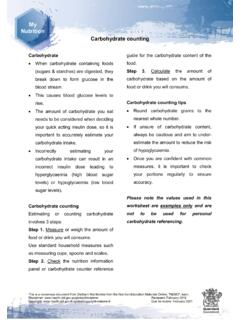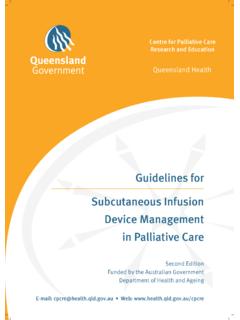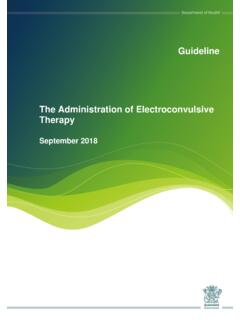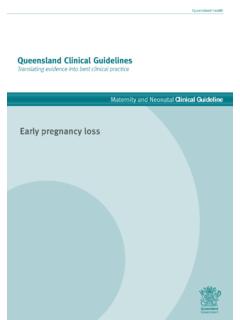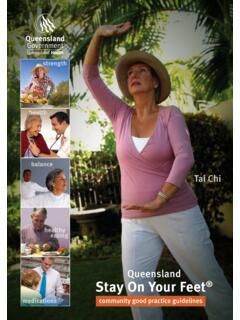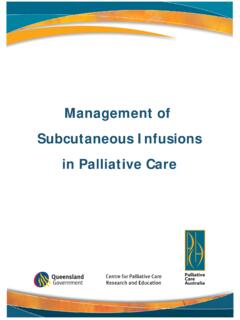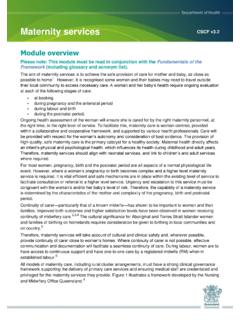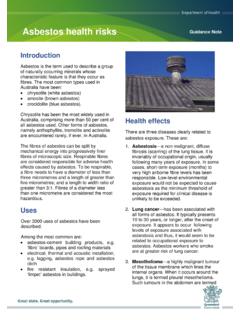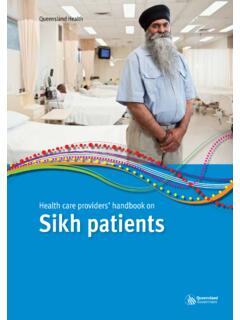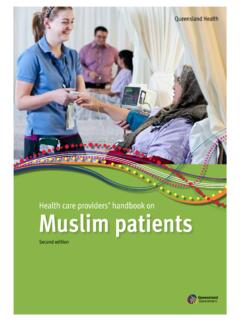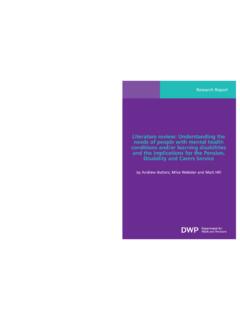Transcription of Information Sharing Guidelines - Queensland Health
1 Sharing relevant Information For most people with a mental illness, the meaningful engagement of people who play a significant part in their lives is an important part of their recovery. It is fundamental to a consumer centred approach that Information is shared as often as possible between clinicians, consumers and those involved in helping a person s recovery. It is also imperative to share relevant Information to protect the Health , safety and well-being of consumers, their families, carers , support people and other people who may interact with the consumer. In keeping with best practice, mental Health clinicians should ensure that everyone identified as important to the consumer is appropriately engaged and involved in the consumer s treatment and care. Sharing relevant Information may help enhance relationships between the consumer and their carer/family. It may also assist in reducing stress experienced by the carer/family member and be beneficial to their own mental and physical Health .
2 Mental Health services will also receive and consider Information from anyone who has an interest in a consumer s Health and wellbeing. This document provides Information on the legislative framework within which consumer Information can and should be shared, and how it can be applied in clinical practice. Queensland legislation enables Information Sharing Queensland legislation provides a flexible legislative framework which supports Queensland clinicians in Sharing Information in certain situations, while recognising the consumer s right to confidentiality and privacy. As far as possible, the consumer s preferences regarding disclosure of Information should be respected. The Hospital and Health Boards Act 2011 (HHB Act) allows for Information Sharing in a range of circumstances, from those in which clinicians are required by law to disclose Information to protect the Health , safety and well-being of consumers, carers or the community, to those in which clinical judgement is required in deciding what Information should be shared and with whom.
3 The HHB Act provides for a designated person to share relevant confidential Information where it is required or permitted under the HHB Act. The definition of designated person (part 7, section 139 of the HHB Act) is provided in Appendix 1. The Mental Health Act 2016 (MHA 2016) also allows for designated persons to share confidential Information when carrying out their responsibilities under the MHA 2016. Chapters 9 and 17 of the MHA 2016 outline key provisions for Sharing confidential Information and enable confidential Information to be shared with and by families, carers , independent patient rights advisers (rights advisers)1 and other support persons. 1 S293 of the MHA 2016 provides that a Chief Executive of a Hospital and Health Service (HHS) must appoint one or more rights advisers to advise patients and their nominated support persons, family, carers and other support persons of their rights under the MHA 2016.
4 A rights adviser may be either an employee of an entity that a HHS has engaged to provide services (such as a non-government organisation) or an employee of a HHS but not employed in the HHS s mental Health service. For more Information see the fact sheet for independent patient rights advisers. Information Sharing Between mental Health staff, consumers, family, carers , nominated support persons and others Information Sharing - 2 - Other legislation allows for Information Sharing in a range of circumstances to protect the Health , safety and wellbeing of consumers, family, carers and the community, including: Information Privacy Act 2009 (IP Act) Child Protection Act 1999 (CP Act) Domestic and Family Violence Protection Act 2012 (DFVP Act) Weapons Act 1990 (Weapons Act) Guardianship and Administration Act 2000 (GA Act) Powers of Attorney Act 1998 (PA Act). Sharing Information with consent The need to share Information is an ongoing part of treatment and requires issues of consent to be considered at many points throughout a consumer s treatment and care.
5 The Information to be shared will vary depending on the circumstances such as the context for Sharing , the particular issues or needs being addressed and the consumer s relationship or involvement with the person who is to receive the Information . The need for Information Sharing and its relationship to supporting recovery from mental illness should be regularly discussed with the consumer. If the consumer is capable of understanding and consenting to Information Sharing , their consent to appropriate and relevant Information Sharing should be sought, taking into account the relevant legislation and Information Sharing provisions applicable to the situation. In seeking consent, it is important for clinicians, other mental Health staff and rights advisers to: explain the purpose and benefits of Sharing specific Information communicate in a way the consumer will understand, using clear and concise language assure the consumer they can withdraw their consent at any time close the discussion by clarifying the shared understanding of what has been agreed document the agreed outcome of the discussion in the consumer s clinical record.
6 Where a consumer provides general consent to share Information with those involved in their treatment and care, consent does not need to be sought before every instance of Information Sharing . If the consumer lacks the capacity to consent, the clinician should as far as practicable: consider whether a relevant advance Health directive has been made where possible, identify and seek consent from their appointed guardian or attorney make ongoing attempts to seek consent, particularly when the consumer s mental state improves where appropriate, share Information without consent as permissible by law. Information Sharing - 3 - If the consumer is a child If the consumer is a child, the clinician must seek the consent of their parent or guardian unless the clinician believes the child is mentally and emotionally mature enough to understand and consent to the Information Sharing . A clinician should apply the Gillick Test2 to determine if a child is capable of making their own decision about Information Sharing .
7 The Gillick Test refers to the common law as it applies to a young person s ability to consent to medical treatment. Consent is based on the capacity of the young person to understand the nature and extent of treatment, the side effects of treatment and the ability of the young person to communicate their decision. Sharing in the best interest of the child In circumstances where a child is assessed as capable of making their own decision about Information Sharing , their wishes should be followed unless the child refuses to consent to a disclosure that, in the opinion of the treating clinician, is in the best interests of the child. A clinician should always attempt to obtain consent before using their discretion to disclose Information considered to be in the child s best interests. Sharing Information without consent Mandatory Information Sharing or Information permitted to be disclosed by law In certain circumstances, it is mandatory to report particular Information in relation to a consumer, or discretion may be exercised in deciding whether to disclose particular Information where permitted by law.
8 In providing this Information , the clinician is not deemed to have breached the duty of confidentiality and is protected under the relevant legislation. Information disclosed or shared under a legislative authority should always be documented in the consumer s Health record. Examples: Under the CP Act, doctors and registered nurses are mandated to report to the Department of Communities, Child Safety and Disability Services when they form a reasonable suspicion that a child has suffered, is suffering, or is at unacceptable risk of suffering significant harm caused by physical or sexual abuse, and may not have a parent willing and able to protect the child from the harm. All clinicians have a duty of care to report any reasonable suspicion or evidence of any child abuse or neglect to the Department of Communities, Child Safety and Disability Services, and must notify the Hospital and Health Service Child Protection Liaison Officer or Child Protection Advisor of suspicion or evidence of any form of child abuse or neglect.
9 2 The Gillick Test was established by the English House of Lords decision in Gillick v West Norfold and Wisbech Area Health Authority (1986) AC 112, which was approved by the High Court of Australia in Secretary, Department of Health and Community Services v JWB and SMB (1992) 175 CLR 218. In Gillick, it was held that the authority of a parent decreases as their child becomes increasingly competent. Gillick prescribes that the parental right to determine their child s treatment terminates once a child under the age of 16 is capable of fully understanding the medical treatment proposed. More Information on the Gillick Test can be found in Part 3 of the QH Guide to Informed Decision-making in Health Care. Information Sharing - 4 - Under the Weapons Act, certain clinicians3 may inform the Queensland Police Service of a consumer s unsuitability to possess a weapon a consumer with a history of attempted suicide, aggression and/or violence may be unsuitable to have a firearm because it poses a risk to their Health and safety or the safety of others.
10 Under the GA Act, Health providers4 are to give all necessary Information to a guardian or attorney of an adult who has power for Health matters to enable the guardian or attorney to make an informed decision regarding the adult s treatment and care. Under the DFVP Act, a clinician or other staff member should share Information with prescribed entities, specialist domestic and family violence services and support service providers where there is an assessed risk of domestic and family violence. For more Information on the DFVP Act, see page 6 and Appendix 2. Circumstantial Information Sharing without consent under the HHB Act In some circumstances, where permissible by law, clinicians must consider Sharing Information without consumer consent. This decision should be made on a case-by-case basis based on the clinician s professional judgement. The HHB Act identifies the exceptions to the duty of confidentiality under which Information may be shared without the consent of the consumer.
